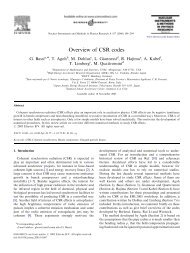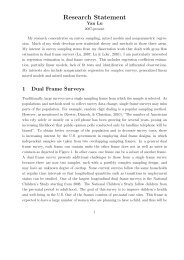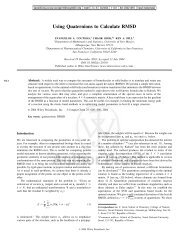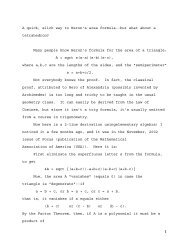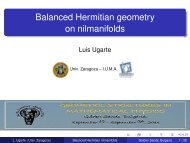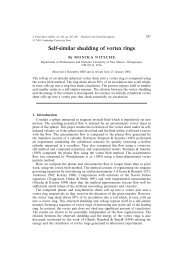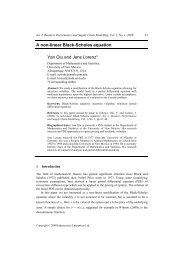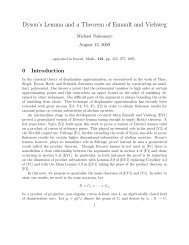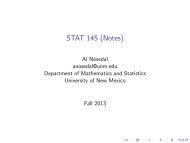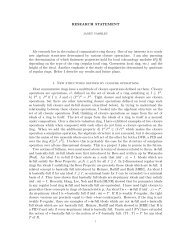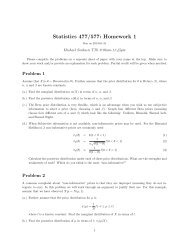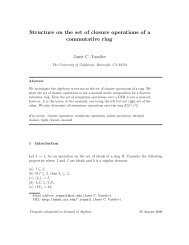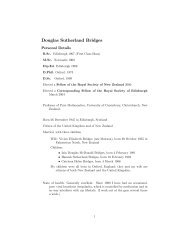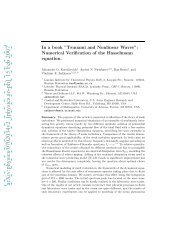OEO Office of Equal Opportunity - Department of Mathematics and ...
OEO Office of Equal Opportunity - Department of Mathematics and ...
OEO Office of Equal Opportunity - Department of Mathematics and ...
You also want an ePaper? Increase the reach of your titles
YUMPU automatically turns print PDFs into web optimized ePapers that Google loves.
200 ARTS AND SCIENCES<br />
*480. Seminar in Comparative Literature. (1-3 to a<br />
maximum <strong>of</strong> 6) ∆<br />
Seminar will deal with individual authors, genres or periods<br />
in two or more literatures. Reference to other subjects.<br />
{Spring}<br />
498. Reading <strong>and</strong> Research for Honors. (3)<br />
Open to juniors <strong>and</strong> seniors approved by the Honors<br />
Committee.<br />
499. Honors Essay. (3)<br />
Open only to seniors enrolled for departmental honors.<br />
500. Introduction to Graduate Study in Comparative<br />
Literature. (3)<br />
551. Problems. (1-6 to a maximum <strong>of</strong> 6) [1-6 to a maximum<br />
<strong>of</strong> 9] ∆<br />
For M.A. c<strong>and</strong>idates. One problems course may be applied to<br />
degree. Requires advisor or chairperson approval.<br />
580. Seminar in Modern Languages <strong>and</strong> Literatures.<br />
(1-6, no limit) †<br />
(Also <strong>of</strong>fered as MLNG 580.) One problems course may be<br />
applied to degree. Requires advisor or chairperson approval.<br />
599. Master’s Thesis. (1-6)<br />
Offered on a CR/NC basis only.<br />
Foreign Languages (MLNG)<br />
No major study <strong>of</strong>fered. See major in Languages.<br />
101. Approaches to Languages <strong>and</strong> Cultures. (3) ∆<br />
An interdisciplinary approach to the interplay <strong>of</strong> languages<br />
<strong>and</strong> cultures in Europe <strong>and</strong> Asia. Focus on the role <strong>of</strong> language<br />
in comparative cultural practices <strong>and</strong> cross-cultural<br />
encounters. Team taught by faculty specialists.<br />
Repeated courses require advisor’s approval; repeatable<br />
only if content/topic changes.<br />
106. Elementary Arabic I. (3)<br />
(Also <strong>of</strong>fered as AFAM 106.) A course in elementary modern<br />
st<strong>and</strong>ard Arabic.<br />
107. Elementary Arabic II. (3)<br />
(Also <strong>of</strong>fered as AFAM 107.) A course for those with very<br />
minimum exposure to modern Arabic language.<br />
109. Biblical Hebrew I. (4)<br />
(Also <strong>of</strong>fered as RELG 109.) Introduction to the language <strong>of</strong><br />
the Hebrew Bible.<br />
206. Intermediate Arabic. (1)<br />
(Also <strong>of</strong>fered as AFAM 206.) The course covers the writing<br />
system, phonology, vocabulary, morphology, <strong>and</strong> syntax<br />
structures <strong>of</strong> the Arabic language. Students will attend language<br />
laboratory to enhance their listening, comprehension<br />
<strong>and</strong> pronunciation skills.<br />
Prerequisites: 107.<br />
207. Intermediate Arabic II. (3)<br />
(Also <strong>of</strong>fered as AFAM 207.) The course increases student’s<br />
reading, writing <strong>and</strong> speaking skills in Arabic including students’<br />
knowledge <strong>of</strong> the writing system, the phonology, the<br />
vocabulary, the morphology <strong>and</strong> the syntax structures <strong>of</strong> the<br />
language. Language laboratory use is optional.<br />
Prerequisites: 206.<br />
*407. Sanskrit I. (3)<br />
(Also <strong>of</strong>fered as LING, RELG 407.) An introduction to the<br />
Sanskrit language in conjunction with readings from classical<br />
Sanskrit literature in translation.<br />
*408. Sanskrit II. (3)<br />
(Also <strong>of</strong>fered as LING, RELG 408.) The continuation <strong>of</strong><br />
Sanskrit I: the completion <strong>of</strong> the study <strong>of</strong> Sanskrit grammar<br />
<strong>and</strong> an introduction to the reading <strong>of</strong> Sanskrit texts.<br />
457. Topics in Languages Studies. [Special Topics in<br />
Languages Studies.] (3, no limit) ∆<br />
Repeated courses require advisor’s approval.<br />
*480. Second Language Pedagogy. (3)<br />
497. Undergraduate Problems. (1-6 to a maximum <strong>of</strong> 6) ∆<br />
Permission <strong>of</strong> instructor required.<br />
500. Teaching Practicum. (1-3)<br />
Introduction to Second Language Acquisition Theory <strong>and</strong><br />
Practice with an emphasis on the communicative methodology.<br />
501. Pr<strong>of</strong>essional Development Colloquium. (1)<br />
A series <strong>of</strong> workshops designed to help graduate students <strong>of</strong><br />
the <strong>Department</strong> <strong>of</strong> Foreign Languages <strong>and</strong> Literatures with<br />
aspects <strong>of</strong> their pr<strong>of</strong>essional development.<br />
580. Seminar in Modern Languages <strong>and</strong> Literatures.<br />
(1-6, no limit) ∆<br />
(Also <strong>of</strong>fered as COMP 580.) Repeated courses require<br />
advisor’s approval.<br />
American Indian Languages<br />
See Linguistics.<br />
Apache (APCH)<br />
No major or minor study <strong>of</strong>fered.<br />
Navajo<br />
See Linguistics.<br />
Quechua (QUEC)<br />
See Latin American <strong>and</strong> Iberian Institute.<br />
Zuni (ZUNI)<br />
No major or minor study <strong>of</strong>fered.<br />
French<br />
Undergraduate Advisor:<br />
Walter Putnam, Ortega Hall 323B, (505) 277-1182<br />
Lower-division Coordinator:<br />
Marina Peters-Newell, Ortega Hall 319B, (505) 277-0525<br />
Major Study Requirements<br />
1. Thirty hours in French courses numbered above 290,<br />
including 301, 302, 305, 345, 346, 351, <strong>and</strong> 352. One<br />
content appropriate Comparative Literature course may<br />
be counted.<br />
2. One 400 level French course, <strong>and</strong><br />
3. Two years <strong>of</strong> college work in another foreign language<br />
(or reading knowledge).<br />
Second Major Study Requirements<br />
Students who present two majors (French <strong>and</strong> another field)<br />
are required to take 24 hours in French courses numbered<br />
above 290, including 301, 302, <strong>and</strong> 305. One content appropriate<br />
Comparative Literature course may be counted.<br />
Minor Study Requirements<br />
Fifteen hours in French courses numbered above 290, including<br />
301 or 302.<br />
UNM CATALOG 2006–2007 Symbols, page 611.



